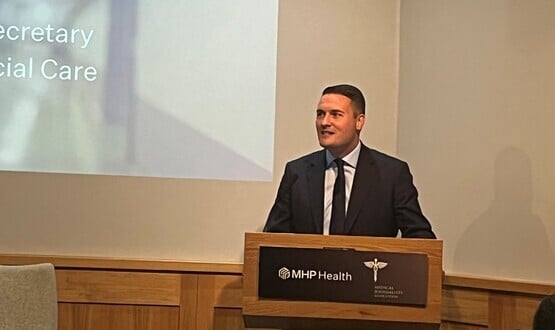2024 predictions: Digital Health leaders look ahead to new year for NHS
- 2 January 2024

After a year of every intensifying workforce and funding pressures, NHS digital leaders are looking forward to 2024 both hopefully and with some apprehension.
A group of NHS clinicians and digital leaders shared their thoughts and future aspirations for the health service with Digital Health News. They expect the health service to be under ever greater pressure to show results from national investments, to improve greater integration of systems and to embed digital skills in a broader cross-section of the health workforce.
Here are their predictions and expectations for 2024:
Nick Black, chief digital information officer at Gateshead Health NHS Foundation Trust and chair of the North East & North Cumbria Chief Information Officers Network
“I think there will be a real push for innovative stories to demonstrate the investment and support of the government in improving the efficiency, safety and effectiveness of the NHS – to improve patient care.
“This will include the AI work on Lung Health, RPA, and Diagnostic Testing. This will lead to a real pressure on digital resource capacity in provider organisations as they are impacted by staff vacancies, maintaining business as usual and trying to deliver the new and shiny.”
Joe Harrison, chief executive at Milton Keynes University Hospital NHS Foundation Trust and national director – digital channels
“As we end 2023 with record numbers of citizens accessing the NHS App, the opportunities in 2024 to further support the delivery of patient care with innovative technologies are really opening up.
“Next year we will see the NHS App grow even more, developing new ways to enable people to stay healthy as well as supporting patients who are ill to manage their care. These developments will both support the NHS to deliver better care, as well as save money as we become more efficient.”
Dr Penny Kechagioglou, consultant clinical oncologist, chief clinical information officer and deputy chief medical officer at University Hospitals Coventry and Warwickshire
“As a result of the increasing complexity of clinical pathways, treatments and administrative tasks in healthcare, we will see an explosive expansion of generative AI use in 2024 and some AI benefits being realised mainly in terms of process improvements and cost savings.
“I predict that the impact of AI use and automation on workforce capacity and wellbeing will become clearer in 2024, as more people are trained in digital technologies, data analytics and AI tools, resulting in skill expansion and new job roles in healthcare.
“I remain hopeful that during 2024, more Board level chief digital information officer roles will be established in the NHS, with combined clinical, commercial, innovation and digital skills, to lead the digital hospitals and systems of the future.”
Ben Jeeves, advanced practice physiotherapist, AHP professional lead and associate chief clinical information officer (ACCIO) and clinical safety officer (CSO) at Midlands Partnership University NHS Trust
“One of the main challenges I think needs emphasising is one that we inherit in 2024, and is likely to remain for some time (well, maybe never go away….). I say this with our workforce in mind, which has many facets.
“Workforce pressures are well cited, recruitment and retention in general, clinical pressures, burnout and more. All of these bring about additional pressures that build in teams and services and impact on others, and we must very much consider the costs this has on an individual level.
“So for me the focus needs to shift towards the workforce in terms of what digital means at an individual level, and are we really doing enough to firstly truly understand what this means locally, and more importantly what are we going to do to address this?
“How many times have we heard “I’m not technical”, “I’m not digital”, “tech isn’t for me”. These words should stop us in our tracks. Investigate, with compassion, understand and take action. No matter how small.
“I think progress is being made with a number of initiatives around this and I would strongly encourage a shift of focus to people, those on the receiving end of digital.
“You may have a robust training programme for your new system (big or small), and I am certainly not knocking that, essential as it is. But do you follow this up? CAN you follow this up with all the other pressures around?
“One to think about. Training is more than just training.”
Stacey Hatton, Chief Nursing Information Officer (CNIO), University Hospitals of Derby and Burton
Virtual care services are likely to become even more integral to healthcare delivery. Advances in technology, improved regulations, and increased patient acceptance may contribute to the continued growth of virtual care.
Remote patient monitoring devices and wearables are expected to become more sophisticated and widely adopted. These devices could enable real-time tracking of various health metrics, providing healthcare professionals with valuable data for personalised care.
Artificial intelligence (AI) is likely to play an increasing role in diagnostics and decision support systems. AI algorithms may become more accurate and efficient in analysing medical data, aiding healthcare professionals in making faster and more accurate diagnoses.
Clinical Digital Teams, incorporating various healthcare professionals, have demonstrated their value. Recent funding initiatives for implementing comprehensive electronic patient records suggest the need to continue the growth of these teams.
Following the emergence of Chief Digital Information Officer roles in 2023, the trend is expected to persist in 2024, with a potential elevation of clinical digital roles to executive board levels. This evolution underscores the increasing importance of digital expertise in healthcare leadership.
Chatbots and virtual assistants equipped with natural language processing (NLP) capabilities may become more prevalent in providing health information, scheduling appointments, and answering common medical queries. These tools could improve patient engagement and streamline administrative tasks.
We saw some fantastic mental health tech companies at the AI and Data Digital Health conference this year and I predict there will be a growing emphasis on digital mental health solutions. Virtual therapy, mental health apps, and AI-driven tools for mental health assessment and support could see increased development and adoption.
A user-centric approach and the role of user researchers play a crucial role in the healthcare industry, contributing to enhanced patient experiences, improved outcomes, and the overall effectiveness of healthcare services. The NHS has started to recruit to specific ‘User Centred Design’ and ‘User Researcher’ roles in recent years. However, this is not consistent across provider organisations. Ultimately, a user-centric focus and the expertise of user researchers contribute to the humanisation of healthcare, fostering a more compassionate and efficient healthcare ecosystem.
Governments and regulatory bodies may adapt and introduce new regulations to keep pace with the evolving digital health landscape, balancing innovation with patient safety and data privacy. As organisations become more familiar with Information Governance and clinical safety regulations (DCB0129 and DCB0160), I expect that teams will need to quickly adapt their internal processes to deal with these essential regulations more effectively.
Expect continued partnerships and collaborations between technology companies and the NHS, fostering innovation and the development of new solutions. There is often a “them and us” culture seen in the NHS about industry suppliers. The need to improve connections between the NHS and industry suppliers highlights a shared endeavour to improve healthcare for both patients and staff.
It’s essential to note that these predictions are speculative, and the actual developments in digital healthcare in 2024 may be influenced by a multitude of factors, including technological advancements, regulatory changes, and societal acceptance.
Salu Sreedevi, clinical educator for digital safety and transformation at Birmingham and Solihull Mental Health NHS Foundation Trust
“I have been attending the CNIO AP meetings as a part of the Shuri Network. We need basic understanding of how to do a clinical safety case report – what good looks like to be an efficient CSO and how to contribute.”
Richard Barrett, cardiac information systems administrator at Royal Cornwall Hospitals NHS Trust
“In the NHS, integration is pivotal for the digital health industry’s future. Acute hospital trusts are transitioning to integrated Electronic Patient Record (EPR) systems, replacing old Patient Administration Systems and varied Clinical Information Systems.
“These encompass multiple functionalities yet retain connections with specialised systems like cardiac care through APIs and HL7 messaging.
“Hospitals are now also embracing Robotic Process Automation for integrating corporate functions, and utilising advanced RFID patient wristbands for improved patient tracking and bed management, supported by enhanced wireless networks.
“Moving forward, I think Integrated Care Systems will continue to bridge primary and secondary care nationally, with initiatives like the Devon and Cornwall Care Record facilitating a unified healthcare record portal, breaking down historic siloes.
“This integration trend marks a significant shift in the NHS, aiming to streamline processes from a clinical standpoint, while ultimately improving patient care efficiency.
“As an example, CaptureStroke (CS) supports the entire Cornwall stroke care pathway with digitally linked implementations both in the acute trust and the Integrated Community Stroke Service (ICSS), with these ICSS teams being rolled out nationally – and Cornwall being one of the first.
“Personally, I have grand designs for CS as a potential candidate for a general stroke register in Cornwall, offering patients accessibility and the new mobile version of the app makes this a real possibility.”





1 Comments
My cheeky predictions for 2024:
1) ever increasing hype about how AI will revolutionise healthcare
2) ever increasing exhortations for the NHS to “do more for less”
3) ever increasing promises from various political parties about how they are the only party which can “save the NHS”
4) a general election fought and won
5) massive back-pedalling by the newly elective government on their pre-election promises
6) ever increasing exhortations for the NHS to “do more for less”
7) retirement … for me at least!
Have fun at work and have a Happy New Year!
Dave
Comments are closed.